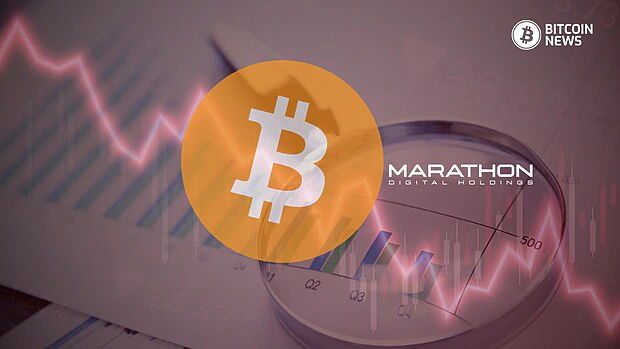Marathon Digital (MARA) is feeling the strain of the bitcoin mining industry despite a favorable post-election rally.
The company’s third-quarter earnings report showed a significant $125 million net loss, a result of rising operating costs, lower-than-expected revenue, and challenging mining conditions.
Despite these setbacks, MARA remains committed to its strategic goals and is taking steps to ensure its long-term growth and resilience in an ever-evolving market.
Related: Bitcoin Mining Faces Profitability Challenges After 4th Halving
In its Q3 2024 Earnings Call, MARA Holdings revealed a net loss of $125 million, or $0.42 per share, missing analysts’ expectations by nearly $50 million.
The company reported $131.6 million in revenue, a 34.5% year-over-year increase from $97.8 million in the same period last year, but below the forecasted $148.1 million.
This revenue gap, combined with rising operational costs, weighed heavily on MARA’s bottom line. According to the company, operating costs increased by $92 million over the year, a primary factor contributing to its wider-than-expected losses.
MARA also noted that it faced additional strain from a 93% increase in the bitcoin mining difficulty during Q3, marking an all-time high that added further challenges for miners worldwide.
Despite financial difficulties, MARA has significantly expanded its bitcoin holdings and hash rate. The company mined 2,070 BTC in Q3 and purchased an additional 6,210 BTC, bringing its total holdings to 26,747 BTC, worth over $2.4 billion.
MARA CEO Fred Thiel emphasized the company’s new policy of holding—rather than selling its mined bitcoin—highlighting the company’s confidence in BTC as a “long-term asset.” The company explained in a letter to the shareholders:
“Our HODL strategy and the opportunistic BTC purchases that we made during the quarter have benefited our shareholders as they continue to see sustained yield when it comes to our BTC holdings from a per-share perspective.”
“While we continue to invest in our mining operations and grow our business, we will also capitalize on opportunities as they arise to purchase BTC, particularly during market downturns,” the company mentioned.
It’s also mentioned that the mining firm is eyeing 50 exa hashes per second as a goal for this year and expects to get there by mid-to-late December.
In a recent interview with Bloomberg, Thiel expressed optimism about the future.
When discussing Bitcoin miners’ ability to move their operations, Thiel focused only on infrastructure diversification and energy needs. When asked about the possibility of restrictive regulations, Thiel downplayed it, saying it was unlikely.
Despite difficulties, MARA’s energized hash rate saw a 93% boost in Q3, increasing the company’s operational potential amid challenging conditions.
The mining company mined 32% more bitcoin blocks compared to the previous quarter, with Thiel highlighting this growth as a “key achievement” that underscores MARA’s position in the bitcoin mining industry.
The bitcoin market has experienced a recent surge following Donald Trump’s re-election as U.S. president, which many in the industry see as a positive shift toward pro-Bitcoin policies.
MARA, along with other digital-asset stocks like Coinbase, has benefited from this optimism, with MARA’s stock price initially surging more than 30% as bitcoin neared $90,000.
Thiel expressed his optimism regarding the new administration’s potential impact on the industry, stating that Trump’s policies could lead to “friendlier laws for crypto.”
Marathon has outlined ambitious goals for future growth, including diversifying into AI-related projects and strengthening its infrastructure.
Related: Bitcoin Miners Should Explore AI and HPC Opportunities | VanEck
The company’s recent acquisition of 372 MW in Ohio, with 152 MW already operational, demonstrates its commitment to expanding capacity. Thiel also highlighted AI as a potential revenue source, appointing an AI expert to MARA’s board, though he clarified that MARA remains focused on bitcoin mining.
Bitcoin mining has become more difficult and expensive in 2024, with mining difficulty reaching a record high. This difficulty spike means miners need even more energy and computational power to mine the same amount of bitcoin, adding financial strain to operations.
MARA’s decision to retain all its bitcoin reserves aligns with its strategy to counteract the mounting costs of mining. Thiel described bitcoin as “the world’s best treasury reserve asset,” reinforcing the company’s intent to hold onto its BTC and rely on its value growth as a financial safety net.
In addition to dealing with mining difficulties, MARA is navigating regulatory uncertainties. The company’s proactive measures, including infrastructure expansion and its AI-focused diversification, reflect an approach to stay resilient amid these challenges.
MARA’s long-term goal is to serve as an energy partner to AI data centers and other high-energy sectors, leveraging its infrastructure to tap into new revenue streams while staying committed to its core mining operations.
While MARA’s Q3 earnings reveal significant hurdles, the company is moving forward with optimism, focusing on strategic expansions and diversifying its capabilities.
The company’s commitment to holding its mined bitcoin, alongside its recent acquisitions in Ohio, show a clear effort to weather the current financial storms while planning for a brighter future.
Thiel’s outlook remains positive, stating that the firm is “in a solid position to move forward” despite industry challenges and rising operational costs.
With Trump’s anticipated pro-Bitcoin policies, MARA and other Bitcoin-related businesses are hopeful for regulatory support in the near future.
This support could alleviate some of the industry’s most pressing challenges, making bitcoin mining a more sustainable venture for MARA Holdings and similar companies.










